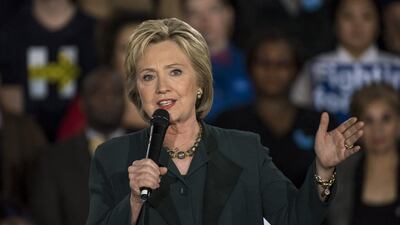The Democratic presidential primary race is shaping up to be a fascinating contest between the voters’ views of two distinct political personalities.
Some find this state of affairs confounding, believing that the election should have been a “slam-dunk” for Hillary Clinton, the former first lady, senator and secretary of state. That a 74-year-old socialist Senator from Vermont is providing real competition is stunning.
Polls show the once cavernous gap that separated the two is closing. They tied in the Iowa primary and Sanders defeated Clinton soundly in New Hampshire. He also raised more money than Clinton in January – nearly all from small individual donors, including a stunning two-day tally of $8 million (Dh29.4m) after his New Hampshire victory.
Several factors appear to be defining this contest. Some are issue related, while others are driven more by, for lack of a better term, “meta-issues”.
On one level, Clinton is running on a rather traditional liberal/moderate platform. She emphasises her experience and her record of getting things done. Her speeches talk about fighting on behalf of groups such as women and children, working families, immigrants, health care and civil rights, offering to make incremental but real change. At the same time, she insists she will be fiscally responsible and support a muscular foreign policy that defends American interests and allies.
Sanders’ stump speech, on the other hand, drives home a single theme – the perceived domination of the US economic and political spectrum by a handful of billionaires who have rigged the system to support their interests at the expense of the majority.
He has called for a political “revolution”, demanding a levelling of the playing field. Expansive programs including as universal health care and free college education would be paid for by imposing taxes on the very wealthy and on excessive Wall Street behaviour. He also emphasises a more restrained foreign policy that avoids irresponsible, costly and unwinnable wars.
Sanders’ edge is that he offers “bumper sticker” clarity that resonates easily with many voters. This clarity is something that Republicans have long owned and Democrats usually miss. While Republicans could speak of “small government and individual freedom”, Democrats would respond with a bewildering array of causes and programmes that lacked a central overarching theme.
With Sanders, Democrats can respond with easily encapsulated themes like “a government that cares” and “we all matter”.
Clinton has criticised Sanders’ programme as unachievable compared to her incrementalist and realistic approach. Democrats and independents who might not agree with Sanders’ philosophy or even believe that his far-reaching proposals will be implemented, but they share his anger at the corrosive effects of inequality and have been captivated by his campaign.
More significant still is voters appear to trust Sanders more, believe that he means what he says and feel he really does care about their concerns. Their reactions and the attitudes stand out in national polls and need to be understood.
Based on entrance and exit polls in Iowa and New Hampshire, Clinton wins easily when it comes to being seen as having the right experience to be president and her ability to win in November. However, Sanders overwhelmingly dominates in the fields of perceived honesty and trustworthiness and for caring about voter’s needs.
These are the core issues that have worked to Sanders’ advantage and help explain why he beat Clinton by six to one among young voters. The Sanders support base overlaps, to some degree, what was called the “Obama coalition” in that it includes young voters.
In The Way We’ll Be: The Transformation of the American dream, a book written by my brother, John Zogby, that defines the value orientation and world views of distinct age groupings among voters. He identifies the youngest of these as the “First Globals”, made up of the first generation of Americans who are global in their world view and accepting of all forms of diversity. Most importantly, they are attracted to qualities like openness, authenticity, and integrity.
These are the core issues Mr Sanders has harnessed and which might not be transferable to Clinton should she win the nomination.
One interesting change is that in the past, younger generations looked to older generations for guidance. That process has been reversed. As was the case with Obama in 2008, many older folks I’ve met this year tell me that they have been inspired to support Sanders because of the enthusiasm he has created among their children and younger voters generally.
It will be important to see how this generational and values-driven struggle will play out. Will voters opt for experience and the perceived “ability to win” or will they gravitate toward a candidate they trust who they perceive cares for them?
Dr James Zogby is the president of the Arab American Institute
On Twitter: @aaiusa


